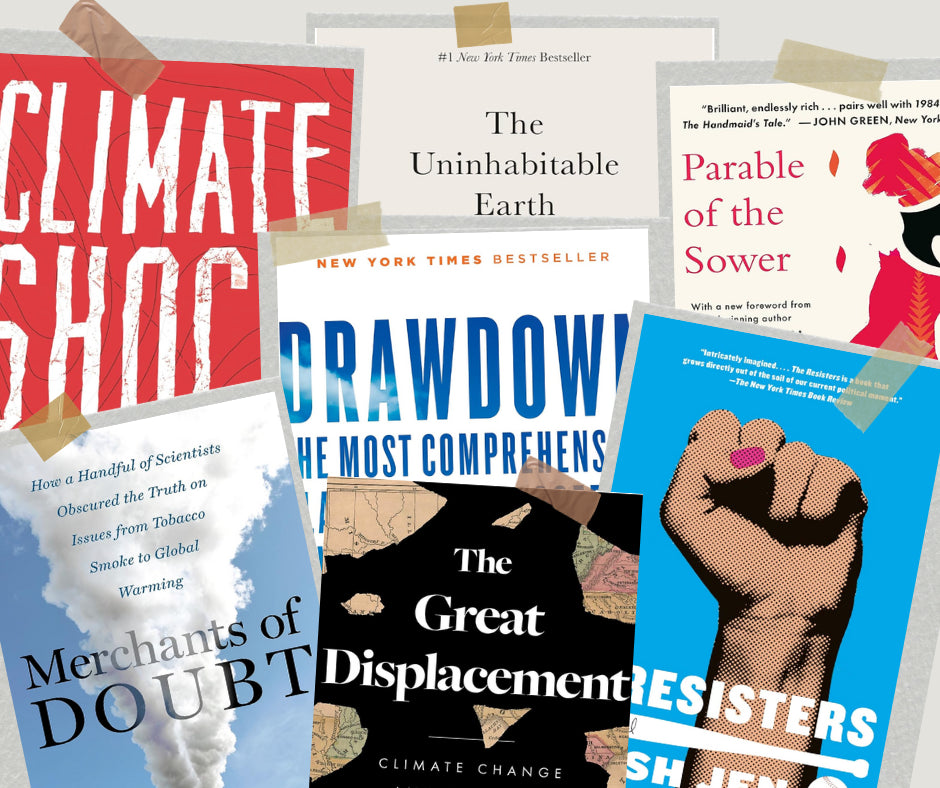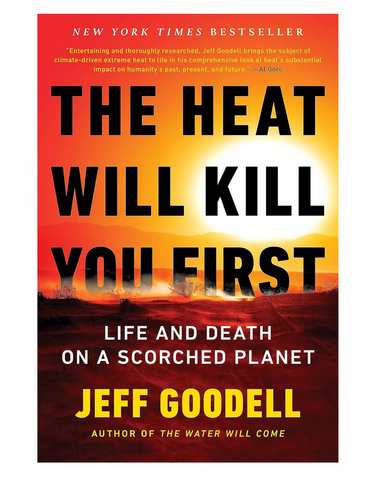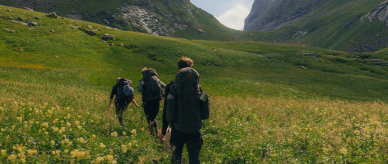In the year 2023, the globe experienced unprecedented high temperatures, accompanied by notable achievements in the battle against climate change. Whether you seek guidance on nurturing your indoor plants, wisdom from Indigenous advocates for the Earth, or support in navigating climate anxiety, delve into these 12 sustainability and climate books that provide valuable insights, inspiration, and a compelling call to action.
1. "The Heat Will Kill You First: Life and Death on a Scorched Planet" by Jeff Goodell:
Published during the hottest month on record, Jeff Goodell's seventh book delves into the alarming consequences of rising temperatures. Through a chilling exploration, Goodell reveals the harsh truths of a planet undergoing warming. He sheds light on various aspects, from the detrimental effects of heat stroke on the human body to the societal divisions exacerbated by the prevalence of air-conditioning. Uncovering profound disparities and injustices laid bare by heat, this compelling narrative serves as a call to action, urging us to confront the tumult spawned by climate change and emphasizing the imperative for united collective efforts.
2. “Cultivating Food Justice: Race, Class, and Sustainability (Food, Health, and the Environment)” edited by Alison Hope Alkon and Julian Agyeman
“Cultivating Food Justice: Race, Class, and Sustainability” examines how food justice is a critical issue in the effort to create a sustainable world. The book explores the intersections between race, class, and food justice, and how these facets shape people’s access to resources and decision-making. Offering essays from a collection of authors and perspectives — including public policy, sociology, environmental studies, and law — the book examines the importance of promoting social equity and provides strategies for creating a more equitable and sustainable food system.
3. "Our Fragile Moment: How Lessons from the Earth’s Past Can Help Us Survive the Climate Crisis" by Michael Mann:
For history enthusiasts and aspiring paleoclimatologists, Michael Mann's book offers a fascinating journey through the annals of our planet's climate history. Mann "inverts" the discussion, guiding readers through millennia of climate change and its profound impact on societies. As he unravels the fragility of our current moment, Mann implores us to channel our fears into righteous anger, urging a collective fight for sustainable solutions.
4. "Ignition: Lighting Fires in a Burning World" by M.R. O’Connor
In the wake of devastating wildfires, M.R. O'Connor provides a unique perspective on the ecology of fire. Through expert reporting and lyrical prose, O'Connor delves into the practice of controlled burning, a tool used by Indigenous communities for centuries. By understanding the importance of "good fire," O'Connor empowers readers to appreciate the role of fire ecology in fostering healthier forests. Her beautifully written narrative invites us to rethink our relationship with fire and its impact on our collective future.
5. “The Upcycle: Beyond Sustainability – Designing for Abundance” by William McDonough and Michael Braungart
If you’ve already read “Cradle to Cradle” by William McDonough and Michael Braungart, then “The Upcycle” is a great follow-up! Drawing on lessons learned from 10 years of applying the cradle-to-cradle concept with businesses, governments, and everyday folks, the authors map out the next step in the solution to our ecological crisis.
From reimaginations of everyday objects from chairs and cars, to factories and homes, this eye-opening, inspiring book shows us that there’s a way to not only sustain life on the planet — but to grow it.
6. "Fighting to Breathe: Race, Toxicity and the Rise of Youth Activism in Baltimore" by Nicole Fabricant:
Nicole Fabricant's eye-opening exploration of the Southern Baltimore Peninsula, where industrial emissions reach alarming levels, serves as a global message on climate crisis activism. Through the lens of the Free Your Voice student group, Fabricant illustrates how young people can drive systemic change. By intertwining racial and environmental justice, Fabricant's narrative becomes a blueprint for communities seeking liberation from historical injustices.
7. The Story of Stuff: How Our Obsession with Stuff Is Trashing the Planet, Our Communities, and Our Health” by Annie Leonard
From sneaking into factories and dumps around the world, to visiting textile workers in Haiti and children mining coltan for cell phones in the Congo, Annie Leonard — named one of Time magazine’s 100 environmental heroes in 2009 — highlights each step of the materials economy and its eye-opening impact on our planet and people.
Drawing on her extensive experience in the field of environmental science, Leonard makes a case for a more sustainable and equitable future by exploring the full cycle of our stuff— from extraction to production, distribution, consumption, and disposal — and ways we can transition into a more sustainable lifestyle.
8. “Traditional Ecological Knowledge: Learning from Indigenous Practices for Environmental Sustainability” edited by Melissa K. Nelson and Dan Shilling
Written by a team of scholars and leading experts in the field, this book offers a comprehensive look into how the Indigenous community has passed down traditional ecological knowledge (also referred to as TEK) for generations — and how this knowledge is essential to working toward global sustainability.
Through personal narratives, historical case studies, and cutting-edge research, readers explore how Indigenous peoples have lived in harmony with their environments for centuries, and how their practices can be applied to current environmental challenges.
9. “Who Really Feeds the World?: The Failures of Agribusiness and the Promise of Agroecology” by Vandana Shiva
Debunking the idea that the answer to addressing a food crisis must be managed through industrial agriculture and genetic modification, author and activist Vandana Shiva argues that those forces are actually the ones responsible for the hunger problem in the first place.
Shiva examines the causes of agribusiness’ failure, like its heavy reliance on chemical inputs, monocultures, and genetically modified organisms, and its disregard for ecological processes and local knowledge. She also looks at how agroecology — an alternative method of food production — offers a viable solution to the current food crisis.
10. “Healing Grounds: Climate, Justice, and the Deep Roots of Regenerative Farming” by Liz Carlisle
A powerful movement is happening in farming today — farmers are reconnecting with their roots to fight climate change. For one woman, that meant learning her tribe’s history to help bring back the buffalo. For another, it meant preserving the forest purchased by her great-great-uncle, among the first wave of African Americans to buy land.
In “Healing Grounds” Liz Carlisle examines the potential of regenerative farming to address climate change, environmental justice, and food insecurity. Carlisle details how regenerative agriculture methods — which focus on soil health and organic farming practices — can boost biodiversity, reduce carbon emissions, and increase access to fresh, healthy food.
By highlighting the value of traditional knowledge, the need for systemic change, and the power of collaboration, Carlisle’s work emphasizes the importance of regenerative farming in creating a more just and sustainable food system.
11. “Farming While Black: Soul Fire Farm’s Practical Guide to Liberation on the Land” by Leah Penniman
“Farming While Black” is the first comprehensive “how to” guide for aspiring African-heritage growers to reclaim their dignity as agriculturists and for all farmers to understand the distinct, technical contributions of African-heritage people to sustainable agriculture.
Author Leah Penniman draws on her own experience as a Black farmer and provides readers with a holistic approach to sustainable farming that includes her core principles: healing, justice, and sovereignty. The book also provides advice on topics such as land access, seed sovereignty, and marketing for small farmers — we love to see that!
12. “Drawdown: The Most Comprehensive Plan Ever Proposed to Reverse Global Warming” by Paul Hawken
Paul Hawken — environmentalist, entrepreneur, author, and activist — has dedicated his life to environmental sustainability. “Drawdown” is his comprehensive plan to reverse the effects of global warming, which include 100 of the most substantive solutions to reverse global warming — based on meticulous research by leading scientists and policymakers around the world.
The book also provides an in-depth analysis of each solution’s economic and social benefits, as well as the challenges and obstacles that must be overcome to implement them. “Drawdown” is a valuable resource for concrete, actionable solutions to address global warming.
The lessons from these climate books beckon us to acknowledge the urgency, embrace righteous anger, and collectively strive for a sustainable and just future. The journey to combat the climate crisis is not a solitary one; it's a shared odyssey that demands our attention, understanding, and unwavering commitment to change.

























